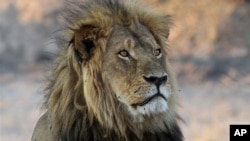A group of activists is trying to persuade an international conservation conference to ban trophy hunting, which outrages some animal lovers but has long been tolerated by some environmentalists as a way of protecting wildlife.
More than 50 members of the European Parliament and 50 environmental groups, led by the Campaign to Ban Trophy Hunting, signed a petition to the triannual CITES conference taking place this week in Geneva.
The Convention on International Trade in Endangered Species of Wild Fauna and Flora (CITES) is an international treaty granting degrees of protection to over 35,000 species.
Agreements passed at the conference are legally binding to 183 signatory states, and although they do not supersede national law, they set standards for global trade and tourism.
A trophy hunting ban is not currently on the agenda as resolutions need to be submitted six months ahead. The meeting started Saturday and continues through Aug. 28, with the main decisions usually finalized over the last two days.
A CITES spokesman declined to comment on the letter and said CITES decisions are taken by governments, not the secretariat.
CITES adopted a resolution at its 2016 conference recognizing the compatibility between well-managed trophy hunting and species conservation.
Trophy hunting, while popular with a small group of wealthy big-game hunters, has come under the spotlight in recent years following several high profile cases. The death of a lion called Cecil, shot by an American dentist in Zimbabwe in 2015, sparked global outrage.
The World Wildlife Fund, which is not a signatory to the anti-trophy hunting petition, supports a limited amount of hunting provided it helps local communities prioritize wildlife conservation over alternatives such as cattle raising and habitat conversion for farming.
Eduardo Goncalves, President of the Campaign to Ban Trophy Hunting, rejects this argument.
"Trophy hunting is immoral and cruel," he said, adding that it often goes hand in hand with poaching. He added that trophy hunting brings in pennies compared to ecotourism.
International Union for Conservation of Nature spokeswoman Rosie Cooney, who is attending the CITES conference, said ecotourism and trophy hunting are not mutually exclusive and both should be used to protect wildlife.





